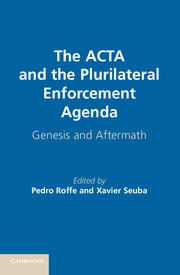Book contents
- Frontmatter
- Contents
- List of Contributors
- Foreword
- Acknowledgments
- Acronyms
- Introduction
- PART I THE FINAL ACT: ITS MAIN FEATURES AND CONTENTS
- PART II DOMESTIC LEGISLATIVE CHALLENGES
- PART III IMPACT ON RELATED PROCESSES
- PART IV VIEWS FROM STAKEHOLDERS: LESSONS
- PART V WHAT LIES AHEAD ACTA
- 21 Assessing the Implications of ACTA for the European Union
- 22 ACTA
- 23 What Was Left Out of ACTA
- 24 Slaying the ACTA Myths
- 25 Developing Countries and the Contestation of ACTA at the TRIPS Council
- 26 ACTA: What Lessons for Future Plurilateral Trade Agreements?
- Annex I Anti-Counterfeiting Trade Agreement
- References
- Index
- References
22 - ACTA
Anatomy of a Failed Agreement
Published online by Cambridge University Press: 05 December 2014
- Frontmatter
- Contents
- List of Contributors
- Foreword
- Acknowledgments
- Acronyms
- Introduction
- PART I THE FINAL ACT: ITS MAIN FEATURES AND CONTENTS
- PART II DOMESTIC LEGISLATIVE CHALLENGES
- PART III IMPACT ON RELATED PROCESSES
- PART IV VIEWS FROM STAKEHOLDERS: LESSONS
- PART V WHAT LIES AHEAD ACTA
- 21 Assessing the Implications of ACTA for the European Union
- 22 ACTA
- 23 What Was Left Out of ACTA
- 24 Slaying the ACTA Myths
- 25 Developing Countries and the Contestation of ACTA at the TRIPS Council
- 26 ACTA: What Lessons for Future Plurilateral Trade Agreements?
- Annex I Anti-Counterfeiting Trade Agreement
- References
- Index
- References
Summary
Introduction
The Anti-Counterfeiting Trade Agreement (ACTA or “the agreement”) is a failed agreement, and represents a failure of international lawmaking. The validity of this statement is not dependent on whether the agreement ever enters into force. Promoted as a “twenty-first-century” agreement aimed at deepening international cooperation and promoting strong enforcement practices, the final text of ACTA accomplishes neither objective.
On the one hand, this failure is unfortunate, as counterfeiting and piracy have rapidly expanded over the past decade and in certain cases represent a serious threat to public health and safety. On the other hand, the failure of ACTA is not necessarily an undesirable result. Beyond the rhetoric, the negotiating objectives of the agreement were ill-defined and the negotiating parties never fully committed to negotiating an agreement which harmonised enforcement standards or truly engaged in serious standard setting. Instead, all of the major negotiating parties simply sought to “harmonise” through the exportation of their own laws to the other parties. With domestic laws diverging in several respects between and among the negotiating parties, the agreement’s original aims slowly faded into the background and the priority became simply to conclude an agreement as opposed to conclude a meaningful agreement. The result is a patchwork of vague legal standards allowing for multiple approaches and interpretations.
- Type
- Chapter
- Information
- The ACTA and the Plurilateral Enforcement AgendaGenesis and Aftermath, pp. 329 - 337Publisher: Cambridge University PressPrint publication year: 2014
References
- 2
- Cited by



